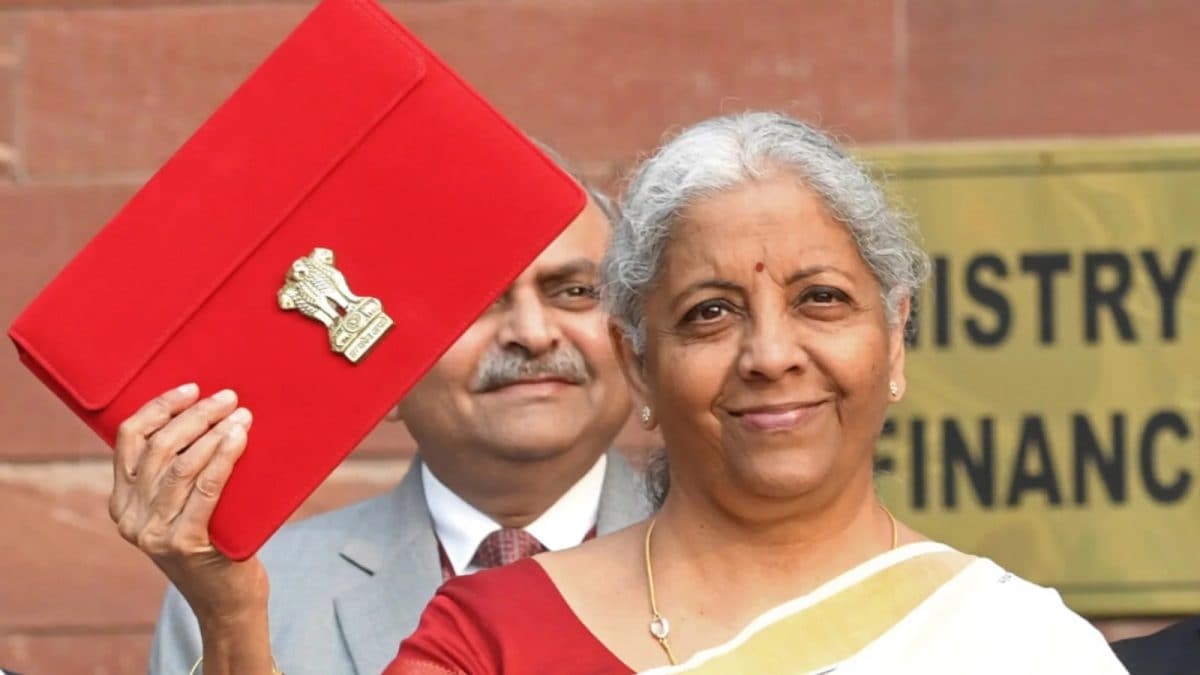Business
Studds Accessories IPO Day 2: Issue Receives 5.08x; Should You Apply? Check GMP

Last Updated:
Unlisted shares of Studds Accessories are trading at Rs 648 apiece in the grey market, which is a GMP of 10.77% over the upper IPO price of Rs 585, indicating mild listing gains.

Studds Accessories IPO.
Studds Accessories IPO Day 2 GMP: Helmets manufacturer Studds Accessories Ltd is witnessing a second day of its Rs 455-crore initial public offer (IPO). The firm has fixed a price band of Rs 557-585 per share, valuing it at around Rs 2,300 crore at the upper end of the range.
On the second day of bidding on Friday, the IPO received a 5.08x subscription, garnering bids for 2,77,11,500 shares as against the 54,50,284 shares on offer. Its retail category has received a 6.03x subscription, while the NII (non-institutional investor) quota has received a 9.62x subscription. The QIB category received a 0.04x subscription.
The company’s Rs 455-crore IPO would conclude on November 3.
Studds Accessories IPO GMP Today
According to market observers, unlisted shares of Studds Accessories Ltd are currently trading at Rs 648 apiece in the grey market, which is a grey market premium (GMP) of 10.77% over the upper IPO price of Rs 585, indicating mild listing gains for investors.
The GMP is based on market sentiments and keeps changing. ‘Grey market premium’ indicates investors’ readiness to pay more than the issue price.
Studds Accessories IPO: Should You Apply?
Anand Rathi Research underscored Studds’ strong domestic footprint and expanding global reach, enabled by a wide distribution network and a commitment to quality backed by major international and domestic certifications.
At the upper price band, the IPO is valued at a P/E of 28.5x based on annualised FY2026 earnings, implying a post-issue market capitalisation of Rs 23,021 million. Anand Rathi noted that while the issue appears fully priced, it has recommended a ‘Subscribe – Long Term’ rating given the company’s industry leadership and growth prospects.
According to Canara Bank Securities, Studds is the largest two-wheeler helmet manufacturer in India by FY2024 revenue and the global leader by volume in CY2024. The company operates three manufacturing facilities with a combined capacity of 9.04 million units and sold 7.40 million helmets in FY2025. It exports to over 70 countries, and a fifth plant is expected to become operational by the end of the year.
The brokerage highlighted Studds’ strong ties with OEMs, supportive regulatory tailwinds such as stricter helmet norms, and a 21% CAGR in exports as key growth drivers. It also pointed out the company’s comfortable liquidity position, with a PAT of Rs 70 crore and cash reserves of Rs 63 crore. However, it noted that topline growth for FY2026 is expected to be modest at 2.1%, and EBITDA remains below pre-COVID levels. Despite this, Canara Bank Securities has issued a “Subscribe” rating on the offer.
Studds Accessories IPO Anchor Investment
The company has raised nearly Rs 137 crore from anchor investors, ahead of the IPO.
Studds Accessories IPO Structure
The IPO is only an offer for sale (OFS), with the promoter group and other shareholders offloading 77.86 lakh shares. Since the issue is entirely an OFS, Studds will not receive any proceeds, and all funds will go to the selling shareholders.
About Studds Accessories
Founded in 1975, Studds designs, manufactures, markets, and sells two-wheeler helmets under the ‘Studds’ and ‘SMK’ brands, as well as a range of motorcycle accessories, including luggage, gloves, rain suits, riding jackets, eyewear, and helmet locks.
While Studds caters to the mass and mid-market segments, SMK, launched in 2016, targets premium motorcyclists.
The company’s products are sold across India and exported to over 70 countries, with key markets spanning the Americas, Asia (excluding India), Europe, and other regions. It also manufactures helmets for international brands such as Jay Squared LLC (sold under the Daytona brand in the United States) and O’Neal, which are distributed across Europe, the US, and Australia.
The company supplies products to leading motorcycle original equipment manufacturers (OEMs), including Hero MotoCorp, Honda Cars India, Suzuki Motorcycle India, Eicher Motors (Royal Enfield), and India Yamaha Motor.
It also caters to government and institutional buyers, such as the Central Police Canteens and the Canteen Stores Department.
The public issue is being managed by IIFL Capital Services and ICICI Securities, with shares expected to list on the stock exchanges on November 7.

Haris is Deputy News Editor (Business) at news18.com. He writes on various issues related to personal finance, markets, economy and companies. Having over a decade of experience in financial journalism, Haris h…Read More
Haris is Deputy News Editor (Business) at news18.com. He writes on various issues related to personal finance, markets, economy and companies. Having over a decade of experience in financial journalism, Haris h… Read More
October 31, 2025, 15:42 IST
Read More
Business
Harry Styles and Anthony Joshua among UK’s top tax payers

The former One Direction member-turned-solo artist appears on the Sunday Times list for the first time.
Source link
Business
From Manufacturing To Infra And AI: Capex Boost Flags Off Budget 2026 ‘Reforms Express’

Last Updated:
Budget 2026: FM Nirmala Sitharaman gives a strong push to manufacturing, infrastructure and job creation, while proposing a simpler tax and customs system.

Finance Minister Nirmala Sitharaman presents the Union Budget 2026-27.
Budget 2026 Takeaways: Finance Minister Nirmala Sitharaman on Sunday presented the Union Budget 2026-27, giving a strong push to manufacturing, infrastructure and job creation, proposing a simpler tax and customs regime, and hailing the government’s modernisation drive as a “reforms express”.
The Budget 2026 is anchored around three ‘kartavyas’ — driving growth by enhancing productivity and competitiveness, building people’s capacity, and ensuring inclusive development under the vision of Sabka Saath, Sabka Vikaas.
In her ninth consecutive Budget in Parliament, Sitharaman laid out a multi-pronged strategy to sustain growth amid global uncertainty, including expanding domestic electronics and semiconductor capabilities, de-risking infrastructure projects, skilling India’s youth for emerging technologies, and easing compliance for taxpayers and importers.
Here are the key takeaways from Budget 2026 across manufacturing, infrastructure, skills, AI, taxation and customs duty.
Manufacturing Gets A Boost
Budget 2026 put a special emphasis on the manufacturing landscape in India. The outlay for electronics components manufacturing was raised sharply to Rs 40,000 crore, while new schemes for rare earth magnets, chemical parks, container manufacturing and capital goods seek to reduce import dependency, and strengthen domestic supply chains. Textiles got an integrated, employment-oriented package covering fibres, clusters, skilling and sustainability.
Infrastructure-Led Growth
Infrastructure got a boost with a higher capex allocation and initiatives like a risk guarantee fund to de-risk projects for private developers, new dedicated freight corridors and national waterways, dedicated REITs (real estate investment trusts) for recycling of significant real estate assets of central public sector enterprises (CPSEs), and a seaplane VGF (viability gap funding) scheme.
The Centre’s capital expenditure (capex) target has been increased to Rs 12.2 lakh crore for FY27, up from Rs 11.2 lakh crore earmarked for the current financial year. Moreover, maintaining the fiscal discipline, Sitharaman said the government expects the fiscal deficit to be at 4.3 per cent of the GDP in 2026-27, lower than 4.4 per cent projected for the current financial year.
Tier-II and Tier-III cities were placed at the centre of urban growth via City Economic Regions, backed by reform-linked funding.
“We shall continue to focus on developing infrastructure in cities with over 5 lakh population (Tier II and Tier III), which have expanded to become growth centres,” Sitharaman said in her Budget Speech.
Greater Emphasis On Skilling
The Budget placed renewed emphasis on the services economy as a jobs engine. A high-powered Education-to-Employment and Enterprise Committee will realign skilling with market needs, including the impact of emerging technologies.
Content creation and creative industries get a boost through AVGC labs in schools and colleges, support for animation, gaming and comics, and new institutional capacity for design and hospitality. Tourism-linked skilling, from guides to digital heritage documentation, signals a clear intent to convert culture and content into employment and exports.
“I propose to support the Indian Institute of Creative Technologies, Mumbai in setting up AVGC Content Creator Labs in 15,000 secondary schools and 500 colleges,” FM Sitharaman said. AVGC stands for animation, visual effects, gaming and comics.
AI & Semiconductors Push
Artificial intelligence (AI) was positioned as a cross-sector force multiplier rather than a standalone theme. The Budget provided a push to artificial intelligence (AI) by promoting adoption with governance, agriculture, education and skilling, including proposals for AI-enabled advisory tools for farmers and AI integration in education curricula.
On hardware, the semiconductor strategy expanded decisively under ISM 2.0 (India Semiconductor Mission 2.0), with focus on domestic equipment manufacturing, materials, research centres and workforce development, signalling a long-term commitment to building a resilient chip ecosystem in India.
Taxation, ITR, TDS, TCS
A major structural reform comes with the Income Tax Act, 2025, effective April 1, 2026, containing simpler rules and redesigned forms.
Budget 2026 provided compliance relief for individuals, including extended timelines for revising returns to March 31 from December 31 earlier, staggered ITR due dates, and easier filing of Form 15G/15H through depositories.
Individuals with ITR-1 and ITR-2 returns will continue to file till July 31, and non-audit business cases or trusts are proposed to be allowed time till August 31, according to the Budget Speech 2026-27.
“I propose to extend time available for revising returns from 31st December to up to 31st March with the payment of a nominal fee. I also propose to stagger the timeline for filing of tax returns. Individuals with ITR 1 and ITR 2 returns will continue to file till 31st July and non-audit business cases or trusts are proposed to be allowed time till 31st August,” Sitharaman said.
TDS (Tax deducted at source) rules were clarified for manpower services, while a rule-based system for lower or nil TDS certificates is proposed. TCS rates were cut to 2% for overseas tour packages, education and medical expenses under liberalised remittance scheme (LRS). Litigation is targeted through integrated assessment and penalty orders, lower pre-deposit requirements, and wider immunity provisions.
TDS on the sale of immovable property by a non-resident will be deducted and deposited through resident buyer’s PAN (Permanent Account Number)-based challan instead of requiring TAN (Tax Deduction and Collection Account Number), Sitharaman said.
Customs Duty Tweaks
Customs duty rationalisation continued with a clear focus on domestic manufacturing, energy transition and ease of living. Exemptions have been extended or introduced for capital goods used in lithium-ion batteries, critical minerals processing, nuclear power projects and aircraft manufacturing.
Personal imports will become cheaper with a reduction in duty on goods for personal use from 20% to 10%. Seventeen cancer drugs and additional rare-disease treatments were exempted from customs duty. Process reforms aimed at trust-based, tech-driven clearances, faster cargo movement and lower compliance costs, especially for exporters and MSMEs (micro, small, medium and enterprises).
STT On F&O Hiked
The Budget increased securities transaction tax (STT) on futures trading from 0.02% to 0.05% and on options trading from 0.10% to 0.15%, a move that upset the capital markets with the BSE Sensex crashing more than 2,300 points from the day’s high and the NSE Nifty dropping to 24,571.75.
Securities Transaction Tax (STT) is a direct tax imposed on the buying and selling of securities in India.
Commenting on the Budget, Prime Minister Narendra Modi said, “The Union Budget reflects the aspirations of 140 crore Indians. It strengthens the reform journey and charts a clear roadmap for Viksit Bharat.”
February 01, 2026, 14:43 IST
Read More
Business
French tech giant Capgemini to sell US subsidiary working for ICE

The firm’s move comes amid global scrutiny of the methods used by the US immigration enforcement agency.
Source link
-

 Sports5 days ago
Sports5 days agoPSL 11: Local players’ category renewals unveiled ahead of auction
-

 Tech1 week ago
Tech1 week agoThis Mega Snowstorm Will Be a Test for the US Supply Chain
-

 Entertainment5 days ago
Entertainment5 days agoClaire Danes reveals how she reacted to pregnancy at 44
-

 Fashion1 week ago
Fashion1 week agoSpain’s apparel imports up 7.10% in Jan-Oct as sourcing realigns
-

 Tech1 week ago
Tech1 week agoICE Asks Companies About ‘Ad Tech and Big Data’ Tools It Could Use in Investigations
-

 Sports5 days ago
Sports5 days agoCollege football’s top 100 games of the 2025 season
-

 Fashion1 week ago
Fashion1 week agoTurkiye cuts benchmark rate to 37%, flags confidence on inflation
-

 Fashion1 week ago
Fashion1 week agoAustralian wool prices climb again as exporters drive demand







